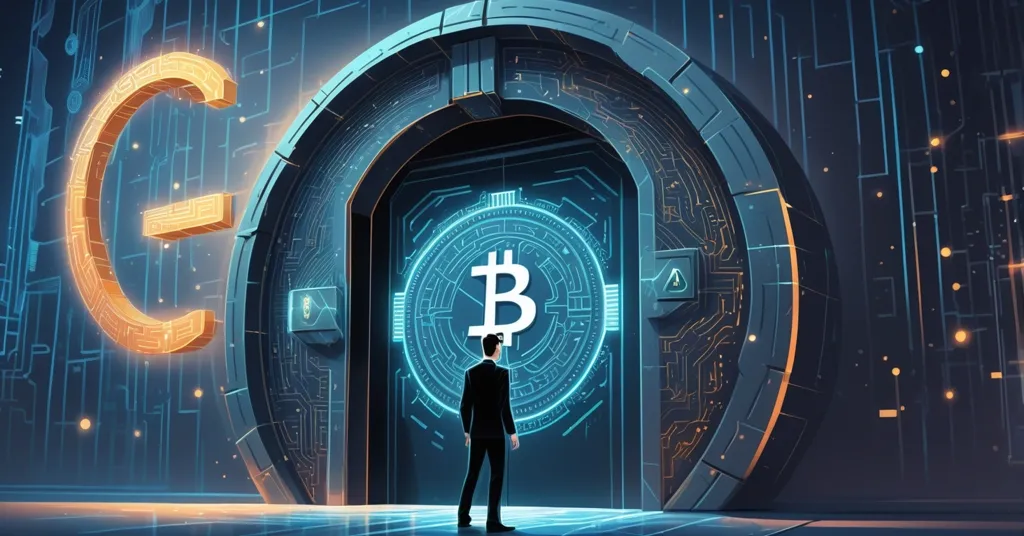Trump Nominates Travis Hill as FDIC Chair: A Pro-Crypto Banking Revolution?

Trump Nominates Travis Hill as FDIC Chair: A Pro-Crypto Shift for U.S. Banking?
President Donald Trump has ignited a firestorm in the financial sector by nominating Travis Hill, the acting chair of the Federal Deposit Insurance Corporation (FDIC), to officially lead the agency for a five-year term. With Hill’s outspoken support for crypto-friendly banking policies and the nomination now before the Senate Banking Committee, this move could redefine how digital assets mesh with traditional finance. Add to that the U.S. Securities and Exchange Commission’s (SEC) bold regulatory reforms under Chair Paul Atkins, and we’re witnessing a potential turning point for cryptocurrency in America. For more on this development, check out Trump’s nomination of Travis Hill and his pro-crypto agenda.
- Key Move: Travis Hill nominated as FDIC chair, pushing pro-crypto banking policies.
- SEC Overhaul: New rules could ease restrictions and integrate crypto with mainstream markets.
- Policy Clash: Trump’s support for digital assets starkly opposes Biden-era crackdowns.
Hill’s Crypto Vision at the FDIC
Travis Hill isn’t your average suit in a government office—he’s shaping up to be a heavyweight for the crypto industry. Having cut his teeth as a senior adviser to former FDIC Chairman Jelena McWilliams during Trump’s first term, Hill took over as acting chair after Martin Gruenberg stepped down in January under the Biden administration. His stance on digital assets is crystal clear: back in March, he declared that banks engaging with crypto is a “permissible activity” and called for the FDIC to issue better guidance on how financial institutions can dive into blockchain tech without getting burned by regulatory ambiguity. This is a direct shot at the debanking crisis—where crypto firms often get ghosted by banks fearing unclear rules or backlash from regulators.
“I expect this to be one of several steps the FDIC will take to lay out a new approach for how banks can engage in crypto- and blockchain-related activities in accordance with safety and soundness standards,” Hill emphasized.
For those new to the game, the FDIC is the U.S. agency that insures your bank deposits, acting as a safety net if your bank collapses. Hill’s leadership could mean banks not only hold digital assets like Bitcoin but also explore tokenization—think of turning a piece of real estate into 1,000 digital shares on a blockchain, letting anyone buy a fraction without owning the whole thing. Picture a crypto startup founder finally securing a bank account without being treated like a pariah—that’s the kind of change Hill’s clarity could bring. After years of firms like exchanges and wallet providers getting their accounts shut down (look at 2022, when multiple U.S. crypto businesses reported sudden closures with zero explanation), this could be a lifeline. Historically, the FDIC under past chairs offered little to no guidance on digital assets, leaving banks to play it safe by shutting out crypto entirely. Hill’s approach feels like a 180-degree turn, and if it sticks, it’s a win for mainstream adoption.
SEC’s Game-Changing Rules: A Parallel Push
While Hill tackles banking barriers at the FDIC, the SEC under Paul Atkins is carving a complementary path for crypto markets. The agency recently rolled out a rulemaking agenda that could blow up the old restrictions on digital assets. We’re talking exemptions and safe harbors for crypto offerings, clearer rules on how broker-dealers—those who legally trade securities, potentially including crypto—can operate, and even steps to allow crypto trading on national securities exchanges. This isn’t just tinkering around the edges; it’s a full-throttle effort to weave digital assets into the fabric of traditional finance.
“This regulatory agenda reflects that it is a new day at the Securities and Exchange Commission. The items on the agenda represent the commission’s renewed focus on supporting innovation, capital formation, market efficiency, and investor protection,” Atkins asserted.
Why does this matter? If these rules come to fruition, they could legitimize crypto in ways we’ve only dreamed of—think Bitcoin ETFs trading alongside blue-chip stocks or Ethereum-based DeFi projects getting fiat on-ramps through regulated brokers. It’s a signal to the market that the U.S. isn’t just tolerating crypto but actively inviting it to the table. For Bitcoin maximalists like some of us, this might raise eyebrows—BTC is king as a store of value, no question. But Hill’s policies and the SEC’s reforms could also pave the way for niche plays that Bitcoin doesn’t cover, like stablecoin integration in banks or complex smart contracts on Ethereum. Each blockchain has its role in this financial revolution, and denying that is just stubborn.
Trump vs. Biden: A Policy Face-Off
Let’s step back for some context. The Biden years were a brutal slog for crypto. The SEC swung hard, targeting giants like Coinbase and Binance with lawsuits over alleged violations, framing the industry as a cesspool of fraud and money laundering. The message was loud: play by our rules or get smashed. While those cases got dropped under Trump’s SEC, the damage lingered—confidence was shaken, and many firms fled offshore. Trump, meanwhile, positioned himself as the “crypto president” during his campaign, vowing to prioritize innovation over enforcement. Hill’s nomination and the SEC’s new direction aren’t just random; they’re calculated moves to reboot U.S. crypto policy and flip the script on Biden’s crackdown.
Could this be the end of crypto’s regulatory exile? Possibly. Trump’s team seems hell-bent on dismantling the old guard’s hostility, and for those of us who cheer decentralization, that’s a damn good thing. Biden’s SEC treated crypto like a piñata at a birthday party; now Trump’s crew looks ready to hand out candy instead. But don’t get too cozy—policy shifts don’t guarantee smooth sailing, and the ghosts of past regulatory overreach still haunt the industry.
Risks on the Horizon: No Road Paved with Lambos
Before we start popping champagne, let’s get real about the risks. Integrating crypto into traditional banking isn’t a walk in the park. Banks jumping into digital assets without ironclad safeguards? That’s a one-way ticket to rekt city if a major hack or black swan event hits. Look at the Terra-Luna collapse in 2022—billions wiped out overnight due to shaky fundamentals. Imagine a bank heavily exposed to a similar volatile asset; systemic stability could take a hit, and taxpayers might foot the bill. Then there’s tokenization—turning assets into blockchain tokens sounds sexy, but without proper audits or legal frameworks, it’s a Wild West waiting for outlaws.
Cybersecurity threats are another beast. Banks aren’t exactly known for being Fort Knox when it comes to tech—remember the Equifax breach? Add crypto’s allure for hackers, and you’ve got a recipe for disaster. And let’s not ignore the pushback: traditional bankers and some regulators will fight Hill’s vision tooth and nail, arguing it undermines financial stability or opens doors to illicit activity. They’re not entirely wrong—money laundering via crypto is real, even if overblown. But here’s the rebuttal: innovation always comes with growing pains, and sheltering the status quo won’t cut it in a world craving financial freedom. The risks are there, no doubt, but so is the potential to disrupt entrenched power structures.
One more wrinkle—key regulatory spots are still empty. A Democratic commissioner seat at the SEC and leadership at the Commodity Futures Trading Commission (CFTC), which oversees futures and options markets including Bitcoin derivatives, remain vacant. These gaps breed uncertainty; markets hate indecision. Yet, they also give Trump room to stack the deck with more pro-crypto voices. It’s a double-edged sword, and how it plays out could make or break this momentum.
A Spark for Decentralized Disruption?
Despite the hurdles, the optimism around Hill’s potential confirmation is palpable. This could be a defining moment for an industry that’s spent over a decade begging for clarity. Pair that with Trump’s broader push for crypto-friendly policies, and you’ve got a shot at mainstream adoption that could ripple globally. For Bitcoin hodlers, clearer banking rules might mean more custodial options. For DeFi developers, expect easier fiat on-ramps if banks start playing ball. And for the average Joe, this could be the first step toward a financial system that isn’t lorded over by gatekeepers.
But let’s not fall for the shills screaming that Hill’s nomination means Bitcoin hits $1M by next Tuesday. Real change takes grind, not TikTok hype. Could Hill’s FDIC be the spark that ignites a decentralized banking revolution—or just another false dawn? We’re betting on disruption, even if the path is messy. After all, shaking up the financial status quo is what crypto was born to do, and for those of us rooting for freedom and privacy, this is a fight worth watching.
Key Takeaways and Questions on Crypto’s Banking Future
- What could Travis Hill’s confirmation as FDIC chair mean for crypto banking?
It could bring clearer guidelines, allowing banks to engage with digital assets and easing the debanking woes that have long plagued crypto firms. - How might the SEC’s new rules impact the cryptocurrency industry?
Exemptions, safe harbors, and trading permissions on national exchanges could legitimize crypto, driving investment and integration with traditional markets. - What’s the difference between Trump’s and Biden’s crypto policies?
Trump leans on innovation with supportive nominations and dropped lawsuits, while Biden’s focus was strict enforcement and industry crackdowns. - Do regulatory vacancies pose a risk to crypto policy progress?
Yes, unfilled roles at the CFTC and SEC create uncertainty, though they also offer Trump a chance to appoint more pro-crypto leaders. - Could banks handling crypto pose systemic risks?
Absolutely—exposure to volatile markets, hacks, or poorly managed tokenization could destabilize banks, but innovation often demands navigating such risks.



